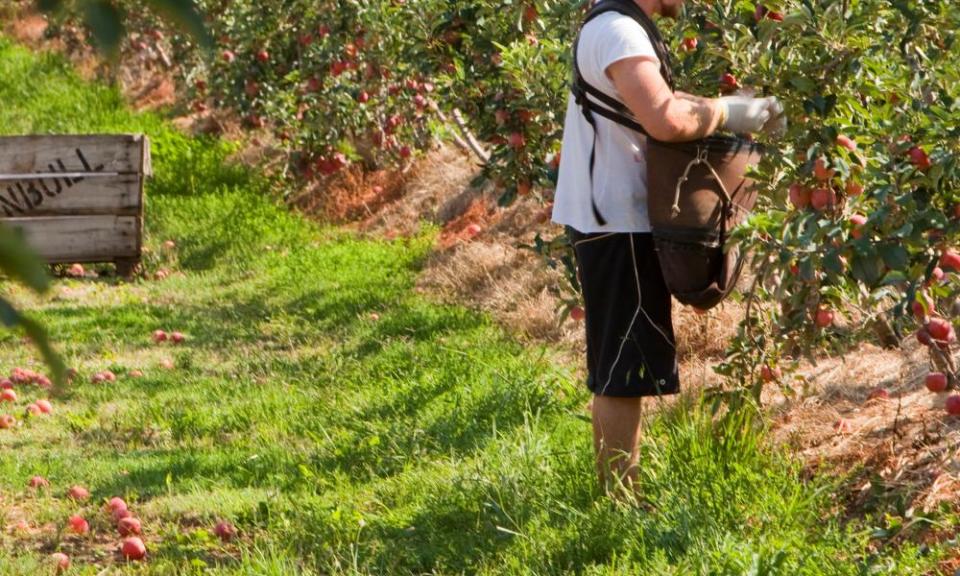Young Australians could be given jobseeker payments as incentive to pick fruit

Young Australians could be incentivised with jobseeker payments to pick fruit as short-staffed farms desperately seek to make up for absent backpackers due to Covid-19 border restrictions.
A parliamentary inquiry on Tuesday recommended the government “urgently” set up a program targeted at year 12 and university students, encouraging them to “have a gap year at home” by moving to regional Australia to pick fruit.
At the same time, a growing list of MPs – including Labor’s shadow immigration minister, Kristina Keneally – are also backing an idea where refugees are offered permanent residency if they pick fruit on short-staffed farms.
The inquiry into working holiday makers released its interim report on Tuesday, looking at solutions for the labour crisis facing farms due to the coronavirus.
Chaired by Liberal MP Julian Leeser, it recommended that domestic farm workers be made eligible for jobseeker payments while working, meaning they could receive two income streams.
Workers would get one-off payments to cover travel and living costs, and could also have their Hecs/Help debts reduced, according to the inquiry’s recommendations.
Under coronavirus restrictions, the number of working holiday makers has halved from 140,000 to 70,000 between March and June.
Also on Tuesday, Labor MP Julian Hill, Nationals MP Damian Drum and Liberal MP John Alexander said they would personally back a system where refugees on temporary visas were given permanent residency if they worked on farms.
The proposal, suggested by the Refugee Council of Australia, would offer people on temporary protection visas (TPV) or safe haven enterprise visas (Shev) permanent residency after one or two years working on farms.
Currently, thousands of people who have been found to be genuine refugees are on the temporary visas, and have waited in Australia for years without permanent residency.
The Refugee Council of Australia told the inquiry that there are 17,000 people on either TPVs or Shevs who “are able to fill labour shortages across Australia”.
Hill told Guardian Australia that the idea would be a “win-win”. Alexander told the Sydney Morning Herald it was “a reasonable idea” and Drum said “it merits a genuine look”.
Keneally said on Tuesday afternoon she was also “keenly interested” in the idea.
“With the right safeguards in place to prevent the exploitation we’ve seen in the backpacker visa scheme, this could be a win-win for both farmers and refugees,” she told Guardian Australia. “I’m keenly interested to understand how the government MPs who proposed this idea see it working in practice.”
According to an ongoing survey conducted by the Refugee Council, 81% of temporary visa holders said they would be willing to work in regional areas of Australia if promised a permanent visa after one year.
Hill said he received positive feedback on the proposal and was excited by the cross-party support.
“My personal view, as a Labor MP, is that TPV and Shev holders should simply be given a permanent visa,” he said.
“However, we are not the government, and this proposal supported by the Refugee Council and many farmers’ groups, is absolutely worth exploring as a compromise position and a win-win.”
Greens senator and immigration spokesman Nick McKim said that permanent residency should “not be conditional on doing hard labour”, and the government could instead speed up the processing of temporary visas.
“We are deeply concerned about people on protection visas being used in this way,” he said. “If people are owed protection, that protection should be permanent, and not conditional on doing hard labour.
“The way to resolve this is for the government to start processing claims in a timely fashion, not tying protection to the ability to do manual labour.”
Related: How the climate crisis is changing Australia's wine industry
He added that a way to fix the labour shortage on farms would be to pay workers more.
“There is a significant labour shortage in the agriculture sector and the way to address it is for the federal government to ensure that workers are adequately paid and supported to do this work.”
Hill, Alexander, Drum and McKim are all on the standing committee on migration, which wrote the interim report, but the committee has yet to make recommendations on the temporary visa proposal.
In its report, the committee said it was still receiving evidence on that proposal.
A spokesman for the Department of Home Affairs said it would “consider the recommendations of the inquiry” but did not offer any comment on the temporary visa proposal.
“The government has already made changes to allow working holiday makers and seasonal workers to stay an additional 12 months if they work in agriculture,” it said.
The inquiry on Tuesday also recommended that the government offer incentives to those on international student visas to pick fruit.
That would include payments for transport and living costs, and extending visas or “where applicable as counting towards a pathway to permanent residency”.

 Yahoo Finance
Yahoo Finance 